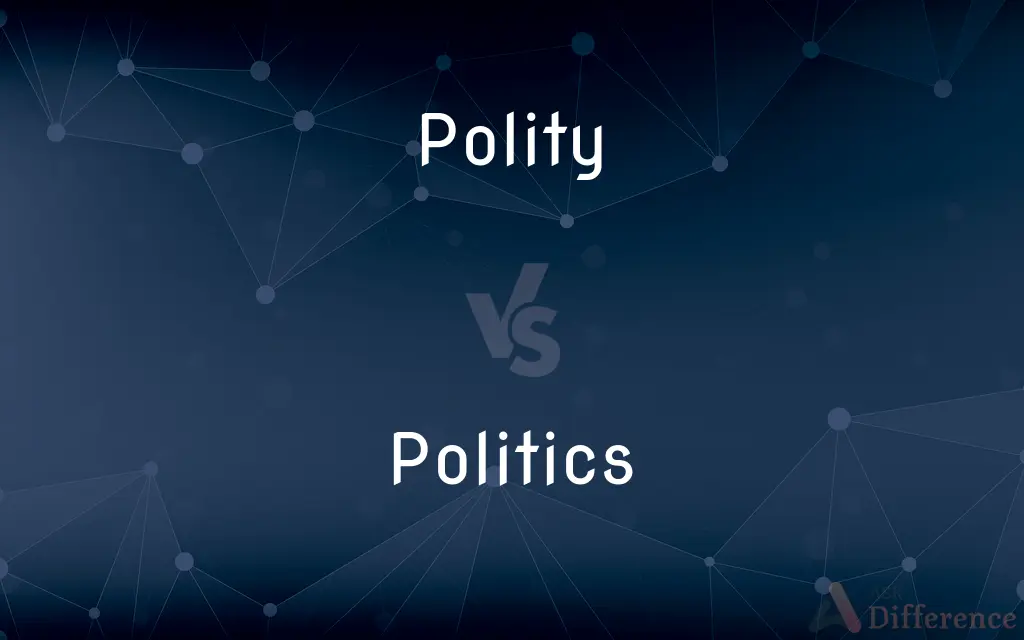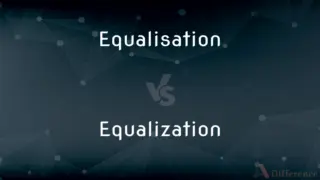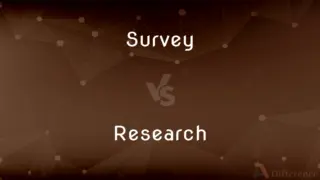Polity vs. Politics — What's the Difference?
By Tayyaba Rehman & Fiza Rafique — Updated on March 26, 2024
Polity refers to a form or process of civil government or constitution, while politics involves activities associated with governance and power dynamics.

Difference Between Polity and Politics
Table of Contents
ADVERTISEMENT
Key Differences
Polity represents the structured form or system of governance of a society, including its constitution and social institutions. It emphasizes the broader framework within which power and authority are organized and exercised. On the other hand, politics is concerned with the practice of influencing, making, and implementing decisions within a group or society, focusing on power dynamics, negotiations, and policies.
The concept of polity is often used in discussions about the nature and characteristics of different government systems, such as democracies, monarchies, or autocracies. It deals with the organizational aspects and foundational principles of a society’s governance. Whereas politics is more dynamic, involving the ongoing processes of policy-making, leadership, and the distribution of power among individuals or groups.
Polity can be seen as the stage upon which the drama of politics plays out. It provides the rules and structures that govern political action and interaction, shaping the boundaries within which political actors operate. Politics, however, is the action itself, driven by ambitions, ideologies, and the pursuit of power, often requiring negotiation, compromise, and sometimes conflict among various stakeholders.
In academic discourse, polity is studied to understand the enduring structures and principles that underpin different types of governments and their effectiveness. This includes examining how laws are structured, the role of institutions, and the distribution of authority. Politics, in contrast, is studied to understand the behaviors, decisions, and strategies of political actors within these structures, including how they pursue and wield power.
Understanding the difference between polity and politics is crucial for analyzing how societies are organized and governed. While polity provides a macroscopic view of governance structures, politics offers a microscopic look at the operations and interactions within those structures, revealing the complexities of power, leadership, and policy-making.
ADVERTISEMENT
Comparison Chart
Definition
The form or process of civil government or constitution.
Activities associated with governance and power dynamics.
Focus
Structure and principles of governance.
Processes of decision-making and power distribution.
Scope
Broad, encompassing governance systems and institutions.
Specific, involving actions and strategies of individuals and groups.
Nature
Static, concerning the organization of society.
Dynamic, involving ongoing interactions and negotiations.
Study
Examines laws, institutions, and authority distribution.
Focuses on behaviors, strategies, and decisions of political actors.
Compare with Definitions
Polity
A politically organized society or state.
The polity faced challenges in adapting to new social norms.
Politics
The art or science of government and governing.
She studied politics to understand how power dynamics shape societies.
Polity
The form of constitution of a country or other organization.
Scholars debate the most effective polity for modern states.
Politics
Activities associated with the governance of a country or area.
Politics in the modern era is heavily influenced by media.
Polity
A particular form of political system or government.
The republic is a polity that emphasizes the role of the citizenry.
Politics
The academic study of government and the state.
His interest in politics led him to pursue a career in political science.
Polity
An identifiable political entity with a set of governance rules.
Ancient city-states were distinct polities with their own governments.
Politics
The debate or conflict among individuals or parties having or hoping to achieve power.
The election season is often marked by intense politics.
Polity
A form or process of civil government or constitution.
The ancient Greek polity was known for its early democratic principles.
Politics
The activities of governments concerning the political relations between countries.
International politics affect global trade and diplomacy.
Polity
A polity is an identifiable political entity—any group of people who have a collective identity, who are organized by some form of institutionalized social relations, and have a capacity to mobilize resources. A polity can be any other group of people organized for governance (such as a corporate board), the government of a country, country subdivision, or a sovereign state.
Politics
Politics (from Greek: Πολιτικά, politiká, 'affairs of the cities') is the set of activities that are associated with making decisions in groups, or other forms of power relations between individuals, such as the distribution of resources or status. The branch of social science that studies politics and government is referred to as political science.
Polity
(politics) An organizational structure of the government of a state, church, etc.
Politics
The art or science of government or governing, especially the governing of a political entity, such as a nation, and the administration and control of its internal and external affairs.
Polity
The form of government of a nation, state, church, or organization.
Politics
Political science.
Polity
An organized society, such as a nation, having a specific form of government
"His alien philosophy found no roots in the American polity" (New York Times).
Politics
The activities or affairs engaged in by a government, politician, or political party
"Our politics has been corrupted by money and suffused with meanness" (Peter Edelman). "Politics have appealed to me since I was at Oxford because they are exciting morning, noon, and night" (Jeffrey Archer).
Polity
(political science) A politically organized unit; a state.
Different nations have different forms of polities, from provinces and states to territories and municipalities.
Politics
The methods or tactics involved in managing a state or government
The politics of the former regime were rejected by the new government leadership. If the politics of the conservative government now borders on the repressive, what can be expected when the economy falters?.
Polity
The form or constitution of the civil government of a nation or state; the framework or organization by which the various departments of government are combined into a systematic whole.
Politics
(used with a sing. or pl. verb) Political life
Studied law with a view to going into politics.
Felt that politics was a worthwhile career.
Polity
Hence: The form or constitution by which any institution is organized; the recognized principles which lie at the foundation of any human institution.
Nor is possible that any form of polity, much less polity ecclesiastical, should be good, unless God himself be author of it.
Politics
(used with a sing. or pl. verb) Intrigue or maneuvering within a political unit or a group in order to gain control or power
Partisan politics is often an obstruction to good government. Office politics are often debilitating and counterproductive.
Polity
Policy; art; management.
Politics
(used with a sing. or pl. verb) Political attitudes and positions
His politics on that issue is his own business. Your politics are clearly more liberal than mine.
Polity
The form of government of a social organization
Politics
(used with a sing. or pl. verb) The often internally conflicting interrelationships among people in a society.
Polity
A politically organized unit
Politics
(countable) A methodology and activities associated with running a government, an organization, or a movement.
Polity
Shrewd or crafty management of public affairs;
We was innocent of stratagems and polity
Politics
(countable) The profession of conducting political affairs.
He made a career out of politics.
Politics
( treated as a plural noun) One's political stands and opinions.
Their politics are clear from the bumper stickers on their cars.
Politics
(uncountable) Political maneuvers or diplomacy between people, groups, or organizations, especially involving power, influence or conflict.
Politics
Real-world beliefs and social issues irrelevant to the topic at hand.
We're trying to talk about comic books, don't mention politics.
Politics
The science of government; that part of ethics which has to do with the regulation and government of a nation or state, the preservation of its safety, peace, and prosperity, the defense of its existence and rights against foreign control or conquest, the augmentation of its strength and resources, and the protection of its citizens in their rights, with the preservation and improvement of their morals.
Politics
The management of a political party; the conduct and contests of parties with reference to political measures or the administration of public affairs; the advancement of candidates to office; in a bad sense, artful or dishonest management to secure the success of political candidates or parties; political trickery.
When we say that two men are talking politics, we often mean that they are wrangling about some mere party question.
Politics
Social relations involving authority or power
Politics
The study of government of states and other political units
Politics
The profession devoted to governing and to political affairs
Politics
The opinion you hold with respect to political questions
Common Curiosities
What is the main difference between polity and politics?
Polity refers to the system or form of government, while politics involves the activities and processes related to governance and power dynamics.
What role does politics play in society?
Politics plays a critical role in determining how resources are distributed, how decisions are made, and how power is exercised, affecting every aspect of societal life.
Can politics exist without a polity?
Politics, in the sense of power dynamics and decision-making, can exist in any group setting, but a structured polity provides a formal framework for political activities.
Why is the study of polity important?
Studying polity helps understand the foundational principles and structures of governance, contributing to insights into the effectiveness and fairness of different government systems.
How does polity influence politics?
Polity sets the rules, structures, and institutions that shape political activities, influencing how power is pursued and exercised.
How does political science study polity and politics?
Political science examines both the structural aspects of polity and the dynamic processes of politics to understand how governments function and how political actors operate within governmental frameworks.
How do changes in polity affect politics?
Changes in polity, such as constitutional amendments or institutional reforms, can redefine power dynamics, influencing political strategies and outcomes.
Can polity be democratic and autocratic?
Polity can take various forms, including democratic systems where power is distributed among citizens and autocratic systems where power is concentrated in the hands of a single ruler or a small group.
What is the relationship between politics and governance?
Politics is the process through which governance is exercised, involving the negotiation, decision-making, and power dynamics that determine how a society is governed.
How do political parties fit into the concept of politics?
Political parties are key actors in politics, organizing to compete for power, influence policy, and represent diverse interests within the framework of a polity.
Is democracy a form of polity?
Yes, democracy is a form of polity characterized by the principles of electoral participation, representation, and the rule of law.
How does culture influence politics?
Culture shapes political values, norms, and practices, influencing political behavior, policy preferences, and the overall political climate of a society.
Can the study of politics lead to better governance?
Yes, studying politics can provide insights into effective leadership, policy-making, and governance strategies, potentially leading to improved societal outcomes.
How do individual beliefs affect politics?
Individual beliefs shape political ideologies, influence voting behavior, and guide political action, affecting the overall direction of political processes.
Why is it important to understand both polity and politics?
Understanding both provides a comprehensive view of how societies are organized, governed, and how individuals and groups interact within these frameworks, offering insights into the possibilities for social and political change.
Share Your Discovery

Previous Comparison
Equalisation vs. Equalization
Next Comparison
Survey vs. ResearchAuthor Spotlight
Written by
Tayyaba RehmanTayyaba Rehman is a distinguished writer, currently serving as a primary contributor to askdifference.com. As a researcher in semantics and etymology, Tayyaba's passion for the complexity of languages and their distinctions has found a perfect home on the platform. Tayyaba delves into the intricacies of language, distinguishing between commonly confused words and phrases, thereby providing clarity for readers worldwide.
Co-written by
Fiza RafiqueFiza Rafique is a skilled content writer at AskDifference.com, where she meticulously refines and enhances written pieces. Drawing from her vast editorial expertise, Fiza ensures clarity, accuracy, and precision in every article. Passionate about language, she continually seeks to elevate the quality of content for readers worldwide.














































